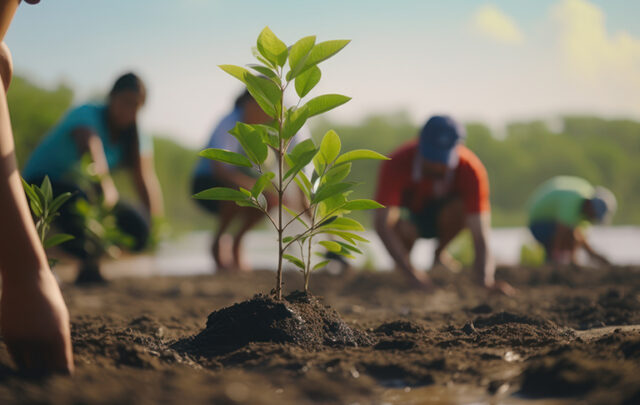(Note: Commentaries do not necessarily represent ASPO-USA’s positions; they are personal statements and observations by informed commentators.)
For two and a half days last week, six twenty-something students had the privilege of attending ASPO-USA’s annual conference in Sacramento. Six in a group of 500 distinguished guests — all older by at least a decade — the blue-uniformed volunteers saw the conference from a much different perspective than many other attendees. What we saw was an organization ready to evolve.
Throughout the conference, the volunteers (affectionately dubbed “The Blueshirts” by Steve Andrews) ended up serving as de facto representatives of the 30 and under demographic. The most common question we received (other than “Where is my name-tag?”) was “How do we get people your age involved?” One word: solutions.*
There will always be more to study about peak oil. But members of ASPO-USA, the other ASPO affiliates, and the peak oil awareness community are in danger of spending so much time forecasting the peak that they forget to explain the consequences of it and plan for life after it — something of chief importance to people our age.
Young people are turned off by the doom and gloom that comes with haggling over the peak date and imagining how difficult and different life will be on the other side of Hubbert’s curve. We believe you when you say it’s going to peak, and those who don’t will when it’s properly explained. We don’t need to be converted, we need to be motivated. Fear is a double-edged sword in that it can both awaken and paralyze. We’re the ones who will have to live and raise children in a post-peak world and that scares us to death. Solutions. Focus on solutions and the twenty-somethings will come.
From what we saw, ASPO-USA’s own members are craving solutions too. The panel sessions that dealt with solar, wind, and alternative transportation had a much perkier audience than many of the others. Never did we see anyone curled up asleep under their suit jacket during a solutions-oriented session like we did during some of the purely problem-oriented ones.
The Blueshirts also noted a desperate need for greater outreach, not just to younger people, but to everyone. As a non-profit, non-partisan research group, ASPO-USA is in a unique position to conduct honest unbiased education. This might need to include, however, the “dumbing down” of some of the association’s more technical subject matter. Maybe this will tarnish ASPO-USA’s reputation as a research group to peak oil insiders, but they are the choir and they no longer need to hear the preaching.
Several speakers at the conference spoke about the need for a “wake-up call” — usually implying that it will come in the form of a single catastrophic event or when prices hit ‘X’ dollars per barrel. This doesn’t have to be the case. It certainly wasn’t for most of the Blueshirts. Our wake-up calls came sitting in the office of a UC Davis professor who took the time to explain the problem to us in terms we could understand. And if you asked what motivated him to gather some alumni and start a student-oriented peak oil group, he’d tell you one thing — ASPO-USA and the outreach session it organized at Denver in 2005.
With outreach — especially at college campuses — students will get their wake up calls and realize that not only will they be forced to deal with the problem but that they have the opportunity to be a part of the solution. Then put us to work. Give us internship opportunities, projects to work on, or free admission to the conference for students who spread the news about peak oil on their campuses. College students care about getting a job after graduation, so if they won’t get involved simply because it’s the right thing to do — give them something to put on their resume and they’ll be there.
The experience of attending this conference and listening in on the brilliant array of speakers was truly an honor. The people we met and the conversations we had left us feeling motivated and ready for more. We hope this privilege will be extended to many more like us in the future.
Alysoun Bonde is a junior at the University of California, Davis. She is an editor with the daily The California Aggie and has served as the outreach coordinator for the campus’s Plug-in Hybrid Electric Vehicle program. She wrote on behalf of fellow students Oded Cedar, Dewight Kramer, Cecilia Landholt, Christina Noble, and George Suarez.
———————–
* Publisher’s note parsing one key word above—“solutions.” This writer avoids the use of the word “solutions” as it can be misconstrued to imply that there are relatively straightforward and timely techno-fixes to our looming peak oil predicament. The possible implication, once we “figure out the right recipe of substitute fuels,” is that we can continue on with our current energy-intensive lifestyle. That’s a fantasy (and one that Alysoun doesn’t intend here). At this late date, with peak oil likely just over the horizon, this writer holds out hope that we will at least “respond intelligently”…
That said, we hear the above call to arms from the motivated and talented UC Davis team…that ASPO-USA needs to objectively explore and articulate the full suite of intelligent responses, adaptations and adjustments that will be required as we head towards the world of tomorrow, a world with more people, a little less oil, and enormous challenges.





